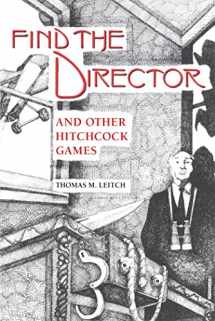
Find the Director and Other Hitchcock Games
ISBN-13:
9780820333496
ISBN-10:
0820333492
Author:
Thomas Leitch
Publication date:
2008
Publisher:
University of Georgia Press
Format:
Paperback
312 pages
FREE US shipping
Book details
ISBN-13:
9780820333496
ISBN-10:
0820333492
Author:
Thomas Leitch
Publication date:
2008
Publisher:
University of Georgia Press
Format:
Paperback
312 pages
Summary
Find the Director and Other Hitchcock Games (ISBN-13: 9780820333496 and ISBN-10: 0820333492), written by authors
Thomas Leitch, was published by University of Georgia Press in 2008.
With an overall rating of 4.2 stars, it's a notable title among other
books. You can easily purchase or rent Find the Director and Other Hitchcock Games (Paperback) from BooksRun,
along with many other new and used
books
and textbooks.
And, if you're looking to sell your copy, our current buyback offer is $0.55.
Description
Developing a model of narrative based on game theory, Thomas Leitch offers a compelling new explanation for the distinctiveness and power of Hitchcock's films. Games such as the director's famous cameo appearances, the author says, allow the audience simultaneously to immerse itself in the world created by the narrative and to stand outside that world and appreciate the self-consciously suspenseful or comic techniques that make the movie peculiarly Hitchcockian.A crucial aspect of the director's gameplaying, Leitch contends, emerges in the way he repeatedly redefines the rules. Leitch divides Hitchcock's career into key periods in which one set of games gives way to another, reflecting changes in the director's concerns and the conditions under which he was making movies at the time. For example, the films of his late British period (the original Man Who Knew Too Much, The 39 Steps, The Lady Vanishes) pivot on witty situational games that continually surprise the viewers; the American films that followed in the next decade (Rebecca, Notorious, The Paradine Case) depend more on drawing the viewer into a close identification with a central character and that character's plight. These films in turn are followed by such works as Rope and Strangers on a Train, in which cat-and-mouse games―between characters, between Hitchcock and the characters, between Hitchcock and the audience―are the driving force. By repeatedly redefining what it means to be a Hitchcock film, Leitch explains, the director fosters a highly ambivalent attitude toward such concerns as the value of domesticity, the loss of identity, and the need for―and fear of―suspenseful apprehension.


We would LOVE it if you could help us and other readers by reviewing the book
Book review

Congratulations! We have received your book review.
{user}
{createdAt}
by {truncated_author}


